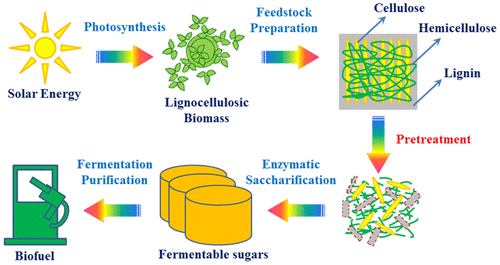Our advanced AI-driven enzyme design platform, EnzymoGenius™ specializes in delivering comprehensive enzyme design and optimization services tailored for the saccharification and fermentation of lignocellulosic biomass, exclusively for scientific applications to empower researchers in the field.
Introduction to Lignocellulosic Saccharification & Fermentation
Lignocellulosic biomass serves as a notable resource for the generation of bioethanol via saccharification and fermentation processes. Key to this conversion is the enzymatic breakdown of complex polysaccharides; often achieved using three main categories of enzymes: cellulases, hemicellulases, and lignases. Cellulases further split into endoglucanases, exoglucanases, and β-glucosidases, all contributing integral roles in cellulose depolymerization. Meanwhile, hemicellulases target hemicellulose, another major biomass component, while lignases facilitate lignin degradation, consequently enhancing cellulose accessibility. The subsequent fermentation process employs yeasts, principally Saccharomyces cerevisiae, converting the resultant glucose into ethanol. This enzyme-mediated process thus furnishes an efficient, eco-friendly strategy for sustainable fuel production from lignocellulosic biomass.
 Fig 1. Alkali-based pretreatment to enhance enzymatic saccharification for lignocellulosic biomass conversion. (Xu H, et al., 2016)
Fig 1. Alkali-based pretreatment to enhance enzymatic saccharification for lignocellulosic biomass conversion. (Xu H, et al., 2016)
Products and Solutions Offering
Custom Products
Our enzyme products tailored for lignocellulosic saccharification and fermentation research include:
- Glucoamylases: Glucoamylases optimized for saccharification and fermentation processes, enhancing enzymatic hydrolysis efficiency.
- Trehalases. Facilitating the conversion of trehalose into glucose for improved bioconversion processes.
- Protease. Serve to enhance protein degradation and assist in optimizing the bioconversion of complex substrates.
- Antibiotic-free Fermentation Additives. Fostering a conducive microbial environment while mitigating the use of antibiotics.
Custom Solutions
Our enzyme solutions for lignocellulosic saccharification and fermentation research encompass:
- Customized Enzyme Engineering: Tailoring enzymes to meet specific biomass compositions and processing conditions.
- Process Optimization: Enhancing enzyme performance in complex fermentation environments.
- Co-factor Engineering: Modifying enzymes to maximize cofactor utilization and minimize inhibitory effects.
- Robust Enzyme Production: Developing production strains for scalable enzyme manufacturing.
Application in Research
- Biofuel Production: Our solutions aid in optimizing enzymatic biofuel production from lignocellulosic feedstocks.
- Biopolymer Synthesis: Enzyme design supports the creation of sustainable biopolymers from biomass.
- Agricultural Residue Valorization: Researchers can utilize our platform to enhance the utilization of crop residues.
- Microbial Consortia Engineering: Enzyme optimization aids in improving lignocellulose degradation within microbial communities.
Technical Advantages
- Molecular Docking: Utilizing docking simulations to predict enzyme-substrate interactions.
- Protein Engineering: Applying site-directed mutagenesis and directed evolution for enzyme enhancement.
- Systems Biology: Integrating omics data to inform enzyme design and metabolic engineering.
- Computational Biology: Employing bioinformatics tools for predictive modeling and enzyme optimization.
CD Biosynsis offers an array of advanced solutions for enzyme design, optimization, and product offerings. Our expertise spans diverse research applications, from biofuel production to biopolymer synthesis and beyond. For further information or to explore how our platform can advance your research goals, please do not hesitate to contact us.
Reference
- Xu, H.; et al. Review of alkali-based pretreatment to enhance enzymatic saccharification for lignocellulosic biomass conversion. Industrial & Engineering Chemistry Research. 2016, 55(32): 8691-8705.

































 Fig 1. Alkali-based pretreatment to enhance enzymatic saccharification for lignocellulosic biomass conversion. (Xu H, et al., 2016)
Fig 1. Alkali-based pretreatment to enhance enzymatic saccharification for lignocellulosic biomass conversion. (Xu H, et al., 2016)